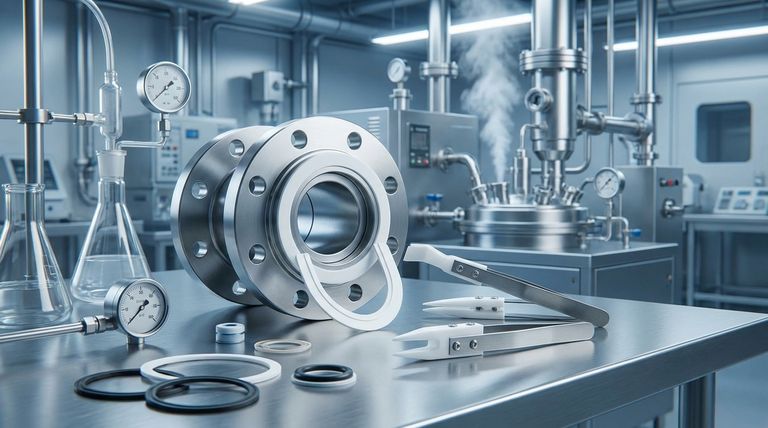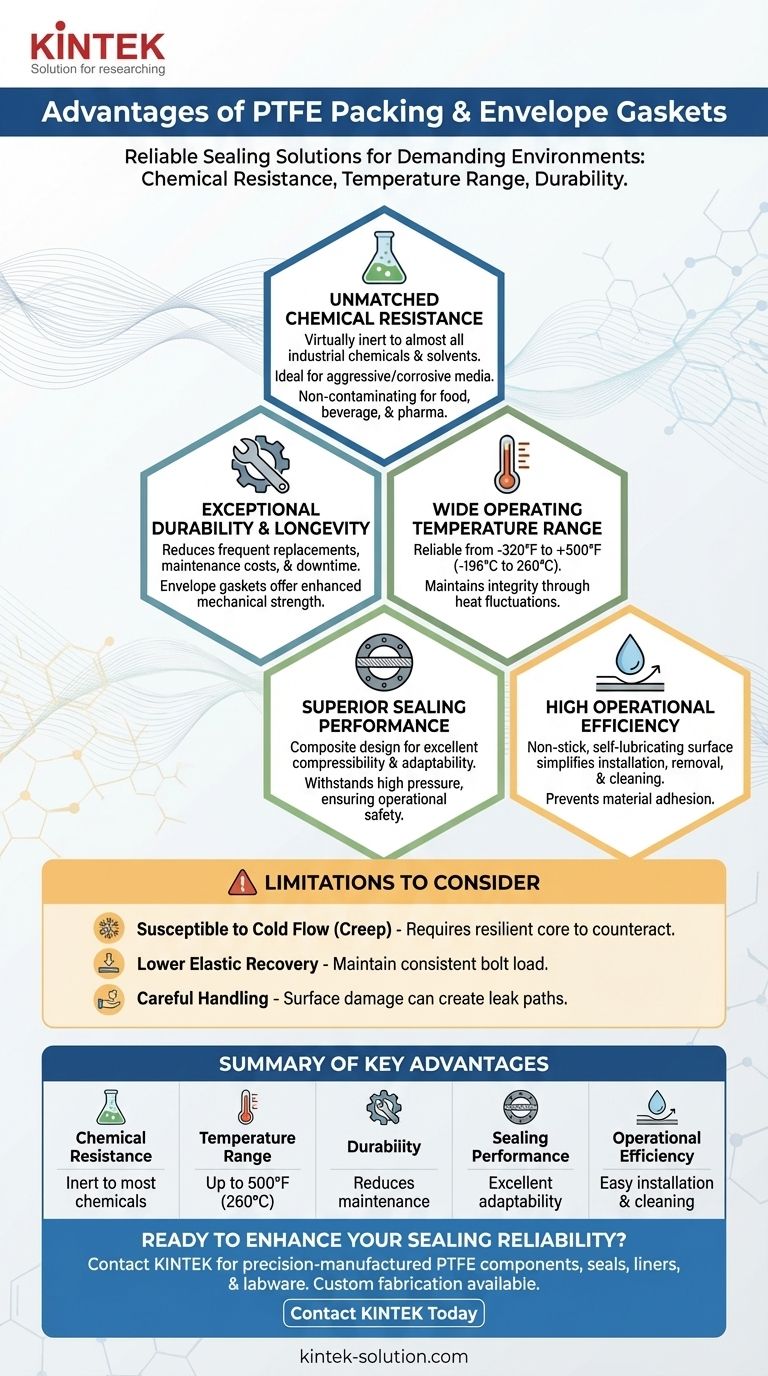In short, PTFE packing and envelope gaskets provide an exceptionally reliable sealing solution for demanding industrial environments. Their primary advantages are unparalleled chemical resistance, a wide operating temperature range, and excellent durability, which together reduce maintenance costs and enhance operational safety.
The core value of PTFE envelope gaskets is their composite design. They combine the superior chemical inertness and low-friction surface of PTFE with the mechanical strength and resilience of a core insert material, delivering a seal that is both highly resistant and structurally robust.

Core Advantages of PTFE Sealing Solutions
PTFE (Polytetrafluoroethylene) is a high-performance fluoropolymer that gives these sealing components their unique and valuable characteristics. The benefits extend across chemical compatibility, operational performance, and long-term cost-effectiveness.
Unmatched Chemical Resistance
PTFE is virtually inert to almost all industrial chemicals and solvents. This makes it the material of choice for applications involving aggressive or corrosive media where other materials would degrade quickly.
Because it is non-contaminating, odorless, and non-absorbent, it is also highly suitable for sanitary applications in the food, beverage, and pharmaceutical industries, reducing the risk of media contamination.
Exceptional Durability and Longevity
The robust design of PTFE gaskets and packing significantly reduces the need for frequent replacements. This durability translates directly into lower maintenance costs and less equipment downtime.
Envelope gaskets, in particular, offer enhanced mechanical strength, allowing them to maintain a tight seal under high bolt loading across large surface areas without being easily damaged.
Wide Operating Temperature Range
PTFE-based seals perform reliably across a broad spectrum of temperatures, often withstanding continuous service up to 500°F (260°C).
This makes them ideal for processes that experience significant heat fluctuations, ensuring seal integrity is maintained where other materials might fail.
Superior Sealing Performance
The composite nature of envelope gaskets provides excellent compressibility and adaptability to flange surfaces. This ensures a tight, consistent seal even on less-than-perfect surfaces.
Their design allows them to withstand high pressure without breaking, ensuring operational safety in demanding systems.
High Operational Efficiency
PTFE's characteristically non-stick and self-lubricating surface simplifies both installation and removal, as the gasket is less likely to adhere to flange faces.
This low-friction property also prevents material adhesion during operation, which makes cleaning processes much easier and more effective.
Limitations and Considerations to Address
While highly effective, PTFE solutions have specific characteristics that require consideration. Understanding these trade-offs ensures you select the right seal for the right application and install it correctly.
Susceptibility to Cold Flow (Creep)
Under sustained compressive load and high temperatures, pure PTFE can be susceptible to creep, or "cold flow," where the material slowly deforms. This can lead to a loss of bolt torque and potential leakage over time.
This is why envelope gaskets with a resilient core material are often preferred, as the core provides structural stability and helps counteract this effect.
Lower Elastic Recovery
Compared to elastomer gaskets (like rubber), PTFE has less "springiness" or elastic memory. It does not rebound as effectively after being compressed.
This means maintaining proper and consistent bolt load is critical, as the gasket may not reseal as effectively after pressure or thermal cycles that cause flange movement.
Careful Handling During Installation
The surface of a PTFE gasket is critical to its sealing performance. It can be susceptible to damage from scratches or gouges from tools or imperfections on the flange face.
Proper flange preparation and careful handling during installation are essential to prevent damage that could create a leak path.
Making the Right Choice for Your Application
To determine if a PTFE solution is right for you, consider your primary operational goal.
- If your primary focus is handling aggressive chemicals: PTFE's near-total chemical inertness makes it the safest and most reliable choice.
- If your primary focus is ensuring product purity: The non-contaminating and non-stick properties of PTFE are ideal for food, beverage, and pharmaceutical applications.
- If your primary focus is reducing long-term maintenance: The exceptional durability of these components minimizes the need for frequent replacement, lowering total cost of ownership.
- If your primary focus is sealing in high-temperature or fluctuating thermal conditions: PTFE's wide operating range ensures a stable and reliable seal where other materials would degrade.
Ultimately, choosing a PTFE packing or envelope gasket is an investment in reliability for your most critical sealing applications.
Summary Table:
| Key Advantage | Description |
|---|---|
| Chemical Resistance | Virtually inert to almost all industrial chemicals and solvents. |
| Temperature Range | Withstands continuous service up to 500°F (260°C). |
| Durability & Longevity | Reduces maintenance costs and equipment downtime. |
| Sealing Performance | Excellent compressibility and adaptability to flange surfaces. |
| Operational Efficiency | Non-stick, self-lubricating surface for easy installation and cleaning. |
Ready to enhance your sealing reliability?
For semiconductor, medical, laboratory, and industrial applications, KINTEK's precision-manufactured PTFE components—including seals, liners, and labware—deliver the chemical resistance, durability, and performance you need. We offer custom fabrication from prototypes to high-volume orders to meet your exact specifications.
Contact KINTEK today to discuss your project and get a quote!
Visual Guide

Related Products
- Custom PTFE Parts Manufacturer for Teflon Parts and PTFE Tweezers
- Custom PTFE Parts Manufacturer for Teflon Containers and Components
- Custom PTFE Bottles for Diverse Industrial Applications
- Custom PTFE Sleeves and Hollow Rods for Advanced Applications
- Custom PTFE Sealing Tapes for Industrial and High Tech Applications
People Also Ask
- What challenges arise when machining PTFE (Teflon)? Overcome Softness, Heat, and Instability
- What are the unique properties of PTFE? The 3 Pillars Driving Demand for High-Performance Parts
- What design considerations are important for custom PTFE parts? Design for Performance & Reliability
- What fabrication services are available for PTFE? Shearing, Stamping, Laser Cutting, Molding & Machining
- What are the unique properties of PTFE? Unlock Unmatched Performance in Demanding Applications



















